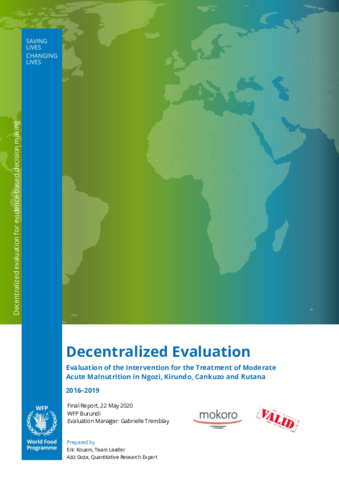
The evaluation was commissioned to enhance project accountability towards the donor and to inform the implementation of future programmes. It was intended for both accountability and learning purposes. It focused on assessing the relevance, coherence, effectiveness, efficiency, impact and sustainability of the MAM Programme. Overarching evaluation questions focuses on alignment of the MAM treatment with the needs of the most vulnerable, the delivered results, the coherence with other donors interventions in nutrition programme, the cost-effectiveness analysis, the contribution of the MAM treatment to changing the nutrition status of the targeted beneficiaries and the sustainability of the programme.
Key evaluation findings included :
- the MAM treatment program remains relevant in the context of Burundi.
- Combining the MAM treatment program with preventive actions is crucial for a long-term effect on the target populations.
- The awareness-raising messages allowed positive changes to the beneficiaries’ eating habits, despite the financial difficulties experienced in obtaining all the necessary foods.
- The inclusion of men as recipients of awareness-raising messages has increased their understanding of the importance of their role in family nutrition.
Key recommendations from the evaluation included :
- Strengthen the capacity of government authorities (Ministry of Health and other key ministries) in planning, implementation and coordination.
- Conduct regular joint supervision in order to strengthen the capacities of the health center officials and SFP managers for the proper application of the national protocol, and the improvement of the quality of services and the monthly data reporting.
- Systematically integrate gender and women's empowerment aspects into program monitoring activities and tools.
- Review the process of service delivery in health centers to reduce the workload of health center officials and SFP managers on distribution days and thus minimize the risk of violence against women.
- Study the possibility of applying a simplified protocol for the management of acute malnutrition in the context of Burundi, in order to overcome difficulties in operationalizing the program, such as dilution and diversion (related to erroneous admissions and shortages of nutritional supplements), and weaknesses in the continuum of care between SAM and MAM.
- Develop and implement joint programs to optimize long-term outcomes and prevent malnutrition.
